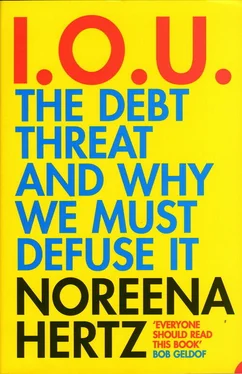The Debt Threat and Why We Must Defuse It

To Jonathan, Arabel and David
Thank you so much.
Cover Page
Title Page I.O.U. Noreena Hertz The Debt Threat and Why We Must Defuse It
CHAPTER ONE Rock The Vote
THE BACKGROUND
CHAPTER TWO It’s Politics Stupid
CHAPTER THREE Backing the Bad Guys
CHAPTER FOUR Pushers and Junkies
CHAPTER FIVE Traders and Vultures
CHAPTER SIX Grey Men in Grey Suits
THE PRESENT
CHAPTER SEVEN Stop Not Making Sense
THE THREAT
CHAPTER EIGHT Can’t Pay Won’t Pay
CHAPTER NINE A Plague On Both Your Houses
CHAPTER TEN It’s Not Just Osama
THE BLUEPRINT
CHAPTER ELEVEN Truth, Reconciliation and Regeneration
Notes
Index
Acknowledgements
About the Author
By the same author
Copyright
About the Publisher
CHAPTER ONE Rock The Vote
‘And ye shall hallow the fiftieth year, and proclaim liberty throughout all the land unto all the inhabitants thereof: it shall be a jubilee unto you; and ye shall return every man unto his possession, and ye shall return every man unto his family.’
Leviticus 25:10 – as partially inscribed on the Liberty Bell
‘Who’s the Elvis here?’ asked the rock star impatiently. The question reverberated through Leslie Gelb’s book-filled office in the beaux-arts brownstone that houses the Council on Foreign Relations. The exasperated tone came from a man accustomed to addressing stadiums filled with fans hanging on his every word and syllable but it was far from an arrogant question.
Gelb had just finished his tutorial on the American power structure by laying out the great chain of influence – from David Rockefeller to UN Ambassador Richard Holbrooke to US Treasury Secretary Robert Rubin to former Chairman of the Fed, Paul Volcker to a number of key Republicans – that led from Wall Street to Washington and back again. Which only served to remind Bono that he was aiming to play in a very different league. Paul McGuinness, U2’s manager, had only just admonished him that it was one thing to lobby for the debt cancellation cause at music industry events but quite another to pilot the issue through the American political process. With these words still clearly ringing in his ears the star tried to find a shortcut towards his goal.
‘You know I’ve got a day job?’ asked Bono half jesting. It was entirely possible that the decidedly un-hip Gelb, then President of the United States’ premier foreign policy think-tank – a place that played host to many self-important investment bankers, foreign service officers, journalists and academic wonks but no conventional celebrities – had no idea why the young man was important.
But Bono’s attempt at humour cut him no slack, Gelb leaned across to him and repeated in rasping tones (he had lost his voice that day) that any one of the names he’d just listed ‘could basically stop this idea from getting off the ground.’ And if Bono truly wanted to get the United States to cancel all the debts owed to it by the world’s poorest countries, not to mention get the US to provide funds to cover monies owed to the World Bank, the IMF and regional development banks, he would need the support of every one of these American dignitaries – and that was just the beginning. Gelb broke the news that there was no single figure with enough clout to pull off such a complicated – and politically inert – manoeuvre. Developing world debt was a diverse issue with many constituencies. For the US government to orchestrate debt cancellation would require the kind of unanimity rarely seen in such a partisan climate. ‘There is no Elvis,’ Gelb finally answered, and ushered the rock star firmly out of the door.
Gelb had been right: there was no Elvis and there were no short-cuts. Eventually Paul Hewson, the Irish singer revered by millions as Bono, would travel back-and-forth across the Atlantic Ocean 30 times, painfully assembling a coalition from some of the world’s least sentimental politicians. After a year and a half beseeching and cajoling, he arranged for a dozen prominent Democrats and Republicans in Congress and the Clinton administration to support a package that pledged to cancel all the debts owed the US by the world’s 33 poorest nations, as well as cover part of what they owed the World Bank and IMF. It was the culmination of the first – and last – serious attempt by the ordinary people of the West to force politicians to address the painful legacy of Third World debt.
But what was it about the debt of developing countries that motivated Bono to go to so much effort? Aren’t all countries in debt? The United States certainly is. It owes $3 trillion, around 10 times what Africa owes, but Bono wasn’t campaigning to cancel that.
The difference is this. The US may be the world’s most highly indebted nation, but it can afford to service its loans, for now at least. The world’s poorest countries in Africa, Asia, and Latin America cannot. Because to do so they have to pay an unacceptably high price, mainly at the expense of their poor or sick. Botswana, in which 40 per cent of adults are now HIV positive, pays more today on debt servicing than it can afford to pay on health care or provision. Niger, the country with the highest child mortality in the world, continues to spend more on debt servicing than on public health. Countries that can’t afford to provide basic health care, education or shelter to their people have to use their pitiful resources, including, in many cases, all their aid flows, to repay debts typically racked up by authoritarian, unelected regimes long since gone. Children in Africa die every single day because their governments are spending more on debt servicing than they do on health or education. The injustice of this situation made Bono mad.
It made him mad too that most developing countries had become so indebted only because the world’s superpowers had callously used them as pawns in the days of the Cold War. And that the rich world continues to lend to dictatorships and corrupt regimes in the poor, despite the fact that it is the ordinary people who live under them who bear the cost. It made him even angrier that the West continues to lend monies to the developing world under the condition that they use them to buy arms, or military hardware. And that to the traders on Wall Street and the vultures who hover over highly indebted countries, debt is just another product to be bought and sold, regardless of the damage their actions so often cause.
But this still doesn’t explain why a rock star turned political lobbyist? Bono could’ve kept his politicking confined to music biz events, and still played a part.
To understand that, we must understand the state of the debt cancellation movement in 1999, the year Bono and Gelb met. In Europe, it enjoyed a very high profile. From inauspicious beginnings at Keele University in central England, in just a few years it had evolved into a broad based alliance – the Jubilee Coalition – which counted churches, the Mothers Union, the British Medical Association, trade unions and aid agencies amongst its members. In Britain, 500,000 ‘Cancel the Debt’ postcards had been sent to Gordon Brown, the British Chancellor of the Exchequer, including one from his own mother; in Italy, rival soccer teams wore debt relief t-shirts; on the same day that Frank Sinatra died, 70,000 Jubilee supporters formed a human chain around the G8 Summit of the world’s wealthiest democracies, to protest against the shackling of the developing world by its rich world creditors.
Читать дальше













